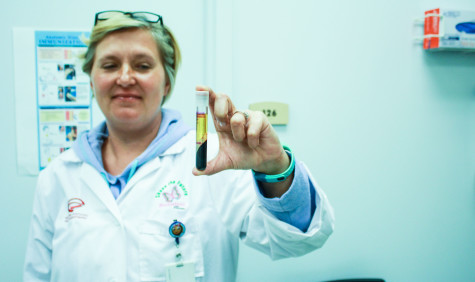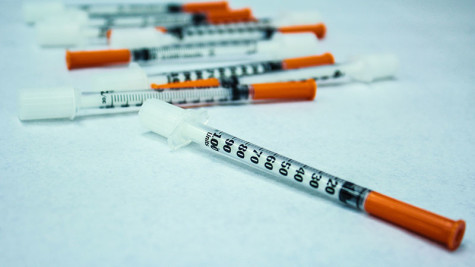VIDEO: Aiding or Enabling?
Syringe access exchange program sparks debate
March 22, 2016
One Northern Kentucky county has launched a controversial new program in an attempt to reduce the region’s hepatitis C rates, which are 19 times the national average.
After years of debate, the Northern Kentucky Health Department opened a syringe access exchange program in Grant County on March 16, the first in Northern Kentucky.
Syringe exchange programs allow individuals using heroin to replace contaminated syringes with sterile equipment. These programs also properly dispose of used needles and provide clients with a sharps container, a portable container made of hard plastic to safely discard contaminated syringes.
Jennifer Hunter, director of clinical services at the Northern Kentucky Health Department, believes that syringe access exchange programs will help curb the spread of blood-borne infection.
“It’s the only public health tool that we have,” Hunter said. “If we had anything else that we could offer to help people not get hepatitis C, we would. But this is it.”
Hunter hopes syringe access exchange programs will help alleviate the staggering rates of hepatitis C, reduce the amount of discarded needles in the community and provide a pathway into treatment.
Although the concept of these programs is not new, the idea of providing heroin users with the tools to inject is controversial.
Dr. Perilou Goddard, an NKU psychology professor, dedicates her research to examining attitudes of various groups of people in regard to potential responses to the region’s heroin crisis, which includes the idea of syringe exchange.
She explained that one reason syringe access exchange programs are so controversial is because people don’t know a lot about them.

“I’ll bet most people in Northern Kentucky would never have thought – our kids, our friends and neighbors, would become dependent on heroin,” Goddard said. “That’s an other people idea. That happens to those people, not to my people. And now, it’s like, ‘Oh… it’s happening to my people. It’s my kids, it’s my neighbors, it’s my students that are experiencing this problem.
“Really we were kind of caught wrong-footed on this. We were caught… not ready for it, we didn’t see it coming. And so these [syringe access exchange programs] are really radical new ideas to people here.”
Kentucky Sen. John Schickel, an NKU graduate, is opposed to the idea of syringe access exchange programs because they provide the equipment that allows individuals using heroin to continue illegal drug use.
“If the police pull you over and you have what they call drug paraphernalia in your car – let’s say something that would be used to smoke marijuana or a scale, that’s called drug paraphernalia,” Schickel said. “Syringes – that’s drug paraphernalia. That’s against the law.
“But yet, we the government are going to provide, at taxpayer’s expense, a means for you to break the law.”
Libby Harrison, project manager of the Cincinnati Exchange Project, explained that syringe access exchange programs provide much more than sterile tools.
The two-year-old program has served over 800 people out of a mobile unit, under one premise.
“Harm reduction, which is the philosophy that we work off of, that’s what we do,” Harrison said. “We recognize that there is innate harm in injection drug use, but we give people the ability to reduce the harm on their own terms.”
In addition to clean injecting equipment, the Cincinnati Exchange Project provides hepatitis C and HIV testing as well as assistance to those who test positive.
Harrison said the program also offers pregnancy testing, as pregnant women are the only demographic that can receive immediate treatment.
For those interested in treatment, Harrison’s program assists in navigating the process.
“People want treatment all the time,” Harrison said. “They come in, they ask for help understanding treatment, where to go. We set up a time to meet later, and then we map out a path of how to get to where they’re going.”
The Cincinnati Exchange Project also offers naloxone kits in order to reduce overdose related deaths in the community.
“A lot of people think that it’s enabling people to use drugs, or to inject specifically, but the truth is, the people who are coming to us were already injecting,” Harrison said. “The only form of enabling we do is enabling people to make better decisions.”
Lynn Smith, an associate professor in the Department of Nursing at NKU, agrees that the programs do not encourage drug use.
“I know that the people who are against these things say, ‘If you give them needles, they’re going to be more apt to inject drugs.’ No, they’re going to inject drugs anyways. They’re addicts, which is actually a mental disease,” Smith said. “It’s recognized as a disease process. So it’s not a matter of just saying, ‘I’m not going to inject a drug.’ They are compelled by their addiction to inject the drug.
“The fact that they are given a clean needle… does nothing at all to affect the disease of addiction. And it’s not meant to.”
In addition to the notion that syringe access exchange programs encourage drug use, those who oppose the programs are also less likely to believe that addiction is a disease, according to Goddard.

“The more people believe that heroin use is the person’s fault – the more they believe that when people use heroin, it’s entirely under their control, it’s something that they can simply quit if they really wanted to … the more they believe that, the less accepting they are of strategies like overdose prevention, medication assisted treatment and syringe access exchange programs.
“[Syringe access exchange programs] are always the least acceptable. That one’s the one that people… it’s like it’s a bridge too far,” Goddard said.
Unlike Goddard, Schickel does not believe that heroin addiction is a disease.
“A lot of people say, ‘Well heroin use is a sickness.’ I disagree with that,” Schickel said. “Use of heroin is a choice, just like smoking is. We make choices in life, and we have to deal with our choices.”
Schickel said while he understands syringe access exchange programs may cut down the spread of hepatitis C, he feels the programs have little impact on the overall problem.
“If you look at our Northern Kentucky Health Department, they kind of have this big brother mentality like they know what’s best for us, and I just don’t agree with that,” Schickel said. “There are arguments that can be made that it [syringe access exchange programs] would cut down on hepatitis, and we need to cut down on hepatitis, but there’s no legitimate evidence that shows that it cuts down on heroin.”
Hunter and other public health officials realize that syringe access exchange programs won’t cure those with a heroin use disorder.
“This syringe access exchange program is not going to solve the heroin problem,” Hunter said. “That’s not what it is. What this will do is help decrease the effects for that person and our community from the hepatitis C rate and the tsunami of HIV that could come after that.”

